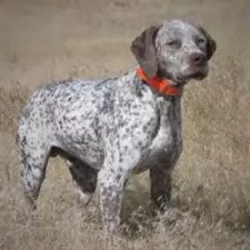 MyDogBreeds
MyDogBreeds Braque du Bourbonnais is originated from France but Poodle is originated from Germany. Braque du Bourbonnais may grow 12 cm / 5 inches higher than Poodle. Braque du Bourbonnais may weigh 9 kg / 19 pounds lesser than Poodle. Braque du Bourbonnais may live 3 years less than Poodle. Both Braque du Bourbonnais and Poodle has almost same litter size. Braque du Bourbonnais requires Low maintenance. But Poodle requires High maintenance
Braque du Bourbonnais is originated from France but Poodle is originated from Germany. Braque du Bourbonnais may grow 12 cm / 5 inches higher than Poodle. Braque du Bourbonnais may weigh 9 kg / 19 pounds lesser than Poodle. Braque du Bourbonnais may live 3 years less than Poodle. Both Braque du Bourbonnais and Poodle has almost same litter size. Braque du Bourbonnais requires Low maintenance. But Poodle requires High maintenance
 The Braque du Bourbonnais is an ancient breed, seen in the 15th century in France in the province of Bourbonnais. He became extremely popular with hunters by the 1800’s as a good pointer. He has become very popular in the United States and all of North America. There are often more puppies born in the U.S. than in France. The British call this breed the Bourbonnais Pointing Dog.
The Braque du Bourbonnais is an ancient breed, seen in the 15th century in France in the province of Bourbonnais. He became extremely popular with hunters by the 1800’s as a good pointer. He has become very popular in the United States and all of North America. There are often more puppies born in the U.S. than in France. The British call this breed the Bourbonnais Pointing Dog.
As with so many European hunting and working dogs, the Braque du Bourbonnais almost disappeared following World War I but was saved by the first breed club, established in 1925. Then following World War II, they were again in danger as the club dissolved and birth rates among the breed decreased drastically.
Actually, there were no dogs at all in the French registry between 1963 and 1973. This was attributed to the fact that the registry put more emphasis on the secondary characteristics such as color, length of tail) instead of the hunting characteristics. Because of this some hunter-breeders vowed to bring the real Braque du Bourbonnais back.
Michel Comte took on this task in 1970 but could not find any dogs with pure Bourbonnais blood. So, he took missed breed with characteristics like the Bourbonnais and inbred several litters until he had a dog he was satisfied with. He registered this dog with the LOF in 1973-75. Seeing this several other breeders got into the act and they successfully brought the breed back.
Michel became president of the new Club du Braque du Bourbonnais in 1981 and remained so until 2001. During this time the breed excelled at field trials and was first sent to the U.S. in 1988. The breed is now thriving in both Europe and North America.
 Poodles are said to be older breed which is developed to hunt waterfowl. They have their origin in Germany and developed as a breed in France. Many different arguements are there in their development. One of the arguement says that they are developed as a result of crossing European Water dogs. Egyptian and Roman histories have proof of Poodles in their drawings and statues. They were categorized into three types according to their size and are Miniature, Toy and Standard.
Poodles are said to be older breed which is developed to hunt waterfowl. They have their origin in Germany and developed as a breed in France. Many different arguements are there in their development. One of the arguement says that they are developed as a result of crossing European Water dogs. Egyptian and Roman histories have proof of Poodles in their drawings and statues. They were categorized into three types according to their size and are Miniature, Toy and Standard.
 This is an elegant breed with a medium sized, muscular bod and a round head. The nose will be the color of the coat and the muzzle is cone shaped with a wide base. He has large dark or hazel eyes, again depending on the color of the coat. The ears can drop below the throat and the neck is very muscular. He has a deep, wide chest and straight, muscular legs. The coat can come in two colors – liver and fawn – and ticked or spotted. They have a typical short pointer type tail.
This is an elegant breed with a medium sized, muscular bod and a round head. The nose will be the color of the coat and the muzzle is cone shaped with a wide base. He has large dark or hazel eyes, again depending on the color of the coat. The ears can drop below the throat and the neck is very muscular. He has a deep, wide chest and straight, muscular legs. The coat can come in two colors – liver and fawn – and ticked or spotted. They have a typical short pointer type tail.
 Poodles today lives a luxury life but actually they are bred to do work. They are well known for their intelligence and are really water retriever. This is because they show their energy in hunting waterfowl. The name Poodle is said to got from German word "Pudel" which means "splash in the water".
Poodles today lives a luxury life but actually they are bred to do work. They are well known for their intelligence and are really water retriever. This is because they show their energy in hunting waterfowl. The name Poodle is said to got from German word "Pudel" which means "splash in the water".
Their hair is trimmed in such a way to make them swim easily. Hair is not trimmed in the joints and organs such that to protect them from cold water. Poodles are well known for their wonderful personality and intelligence. Also they are very obedient and a good companion. They won't be happy if left alone for a long time. Poodles are interested in playing games with people. They perform very well if given a proper training. Good manners should be taught to them as they remember all things they have learned.
 The Braque du Bourbonnais is a gentle, calm dog. He is affectionate and kind when off the job but intelligent, adaptable and serious when hunting. They are intense when learning or hunting and they will learn quickly. They are good with other dogs.
The Braque du Bourbonnais is a gentle, calm dog. He is affectionate and kind when off the job but intelligent, adaptable and serious when hunting. They are intense when learning or hunting and they will learn quickly. They are good with other dogs.
 They are good companions and usually likes to spend time with children. Even they are children friendly it is strongly recommended not to leave children alone with them.
They are good companions and usually likes to spend time with children. Even they are children friendly it is strongly recommended not to leave children alone with them.
Poodles are specialist in hunting water birds. They are good in swimming since they are covered with fur water will not easily get into their ears. They are well known for their intelligence like humans.
They are well suited for apartment living but won't be happy if left alone. They will tolerate hot weather better when compared with cold.
They are quick learners and learn good and bad things very quickly. Once they learn, they won't forget it up. Since poodles are so intelligent they are very easy to train.
 Entropion - both of these are issues with eyelashes turning inward or outward and both can
Entropion - both of these are issues with eyelashes turning inward or outward and both can
 Poodles have more chances for getting eye diseases such as Progressive retinal atrophy and cataracts. Cancer is also seen in them and there are chances of skin problems such as allergies and tumors.
Poodles have more chances for getting eye diseases such as Progressive retinal atrophy and cataracts. Cancer is also seen in them and there are chances of skin problems such as allergies and tumors.
Usually poodles don't shed at all. Excessive shedding is the smptom of allergies in them. When they get other problems shedding accompanies with it. Even an infection may cause hairfall. Ringworm infections and pests should be controlled using appropriate medicines.
 This breed is prone to weight gain and obesity. Be careful not to overfeed them. Don’t free feed them but give them 2-3 smaller meals per day.
This breed is prone to weight gain and obesity. Be careful not to overfeed them. Don’t free feed them but give them 2-3 smaller meals per day.
Entropion - both of these are issues with eyelashes turning inward or outward and both can
Pulmonic Stenosis of the heart- minor will have no symptoms but eventually the heart will not be able to function efficiently and could lead to congestive heart failure.
The Braque du Bourbonnais needs at least a minimum amount of exercise daily , especially if he is not used for hunting. A fenced backyard for playtime would be perfect but long walks will work. He likes to learn tricks, play ball or hide and seek. Outside activities could include hiking, swimming, agility, retrieving, rally and obedience trials, along with the usual field trials.
 Usually puppy eats more food than an adult dog. This is because they need more food to support growth. Actully puppies need two to four times more food than adult. Puppies should eat in such a way that their ribs should not be seen and waist must be visible.
Usually puppy eats more food than an adult dog. This is because they need more food to support growth. Actully puppies need two to four times more food than adult. Puppies should eat in such a way that their ribs should not be seen and waist must be visible.
Poodles can be fed with proteinous food, healthy grains, vegetables and fruits. They love to eat organs such as liver, kidney, brain and chicken breast, turkey and fish. Vegetables such as baby carrots, spinach and peas can be given to them. Make them to eat fruits like raspberries, banana and melon.
Dry kibble is not good for their teeth. Even some premium quality foods are not good for their health. Pig's ears are not safe to chew for them. Vaccinations should be made at the right time.
Exercises play an important role in their health and even extend their life. Poodles should be made to walk regularly. Exercising must be done to a particular level and they should not be over exercised.